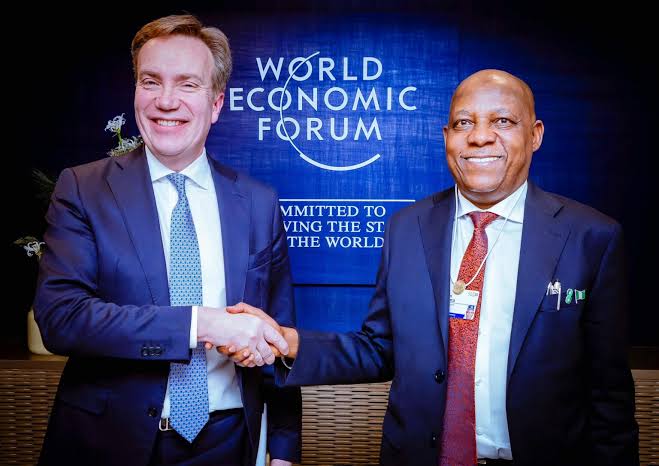The Nigerian government has called for collaboration with the World Economic Forum (WEF) to foster economic development and growth in the country and across the African continent.
Vice President Kashim Shettima stated this on Thursday during a bilateral meeting with the President of the World Economic Forum, Mr Børge Brende, on the sidelines of the ongoing annual meeting of WEF in Davos, Switzerland.
According to a statement by his spokesman, Stanley Nkwocha, Nigeria specifically sought partnerships with the global body on the African Atlantic Gas Pipeline (AAGP), aimed at connecting Nigeria to Morocco and other African countries, as well as the recharging of Lake Chad to address the global food security crisis and other existential threats.
On the African Atlantic Gas Pipeline, Shettima said Nigeria would be in a vantage position to leverage the WEF platform to develop the gas project, highlighting that this would help address geopolitical challenges in Europe and the growing demand for energy due to artificial intelligence, data mining, and storage.
The statement quoted him as saying: “We seek your collaboration in fundamental areas. One is the African Atlantic Gas Pipeline (AAGP), which will connect Nigeria to Morocco and other African countries. The pipeline will transport natural gas from Nigeria to North Africa and Europe and is expected to improve energy security and economic growth in the region.
“With the geopolitical challenges in Europe arising from Russian gas issues and the rising demand for energy due to artificial intelligence, data mining, and storage, we will be in a vantage position to capitalise on this opportunity.
“A number of littoral states in West Africa that have discovered gas are more than willing to integrate into the system and supply their gas to other end users. We are also exploring the option of undersea pipeline passage to ensure it is a win-win for everyone. We want to utilise the WEF platform.”
Shettima told the WEF President that while Nigeria is a country blessed with gas, it is exploring every possible avenue to maximise available opportunities for economic growth and wealth creation for its growing population.
“Nigeria is more of a gas nation than an oil nation. Given our population, we must either provide for our young men and women—our average age is 16.9—or risk potential challenges in the next ten to twenty years. This is why we are in a hurry to develop in our enlightened self-interest. Gas presents us with the greatest opportunity to generate wealth for our people,” he noted.
Regarding the recharging of Lake Chad, the Nigerian Vice President said that, beyond addressing the food security crisis, the initiative would also place Nigeria in a strategic position to generate clean energy and combat terrorism.
He stated: “There is an intrinsic link between the economy and ecology in the Sahel region. The challenges posed by Boko Haram and ISWAP may not be unrelated to the existential threats we are facing.
“Lake Chad was once 25,000 sq. km but has now shrunk to 2,000 sq. km. The proposal to recharge the lake from the Congo River Basin, the second-largest river basin in the world, would redirect water currently flowing into the Atlantic. We want to use your platform to achieve this.
“This will enable us to generate clean energy, produce a significant amount of hydropower annually, and develop a 2,400-kilometre canal that will transform the agricultural landscape of the sub-region. This will help address the global food security crisis.”
The Vice President also briefed the WEF President on the ongoing reforms under President Bola Ahmed Tinubu’s administration, stating that the Nigerian President has set the country on the path of sustained economic growth.
“Most importantly, we are focused on the present. My leader and boss, President Bola Ahmed Tinubu, is someone who grew up in the financial sector. He was a financial controller at ExxonMobil, a transformative leader in Lagos State, and in Nigeria, he is the most disruptive leader we have had in half a century.
ALSO READ: Increase appropriation on education, UNICEF tasks Kano govt
“From his first week in office, he took decisive actions—from the removal of fuel subsidies to the alignment of exchange rates, tax reforms, and numerous other reform initiatives. Our economy has turned a corner, we have crossed the Rubicon, and we are now on the path to sustained economic growth,” he stated.
The Vice President invited the WEF President to Nigeria to meet President Bola Ahmed Tinubu and expressed Nigeria’s readiness to host WEF Africa.
Underscoring the importance of fostering collaboration with WEF for Africa’s growth, VP Shettima highlighted that, apart from being the continent’s largest economy, Nigeria is also its most populous nation, with 250 million people.
“And by 2050, we will be the third most populous nation on earth, surpassing the United States. By the end of the century, Nigeria will be the most populous nation on earth,” he added.









